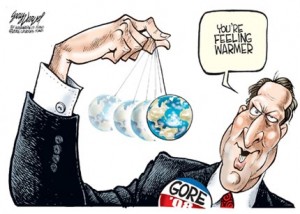Climate-change ‘deniers’ are accused of heresy by true believers. That doesn’t sound like science to me.
by John Steele Gordon • Wall Street Journal
 Are there any phrases in today’s political lexicon more obnoxious than “the science is settled” and “climate-change deniers”?
Are there any phrases in today’s political lexicon more obnoxious than “the science is settled” and “climate-change deniers”?
The first is an oxymoron. By definition, science is never settled. It is always subject to change in the light of new evidence. The second phrase is nothing but an ad hominem attack, meant to evoke “Holocaust deniers,” those people who maintain that the Nazi Holocaust is a fiction, ignoring the overwhelming, incontestable evidence that it is a historical fact. Hillary Clinton’s speech about climate change on Monday in Des Moines, Iowa, included an attack on “deniers.”
The phrases are in no way applicable to the science of Earth’s climate. The climate is an enormously complex system, with a very large number of inputs and outputs, many of which we don’t fully understand—and some we may well not even know about yet. To note this, and to observe that there is much contradictory evidence for assertions of a coming global-warming catastrophe, isn’t to “deny” anything; it is to state a fact. In other words, the science is unsettled—to say that we have it all wrapped up is itself a form of denial. The essence of scientific inquiry is the assumption that there is always more to learn.
Science takes time, and climatology is only about 170 years old. Consider something as simple as the question of whether the sun revolves around the Earth or vice versa.
The Greek philosopher Aristarchus suggested a heliocentric model of the solar system as early as the third century B.C. But it was Ptolemy’s geocentric model from the second century A.D. that predominated. It took until the mid-19th century to solve the puzzle definitively.
Assuming that “the science is settled” can only impede science. For example, there has never been so settled a branch of science as Newtonian physics. But in the 1840s, as telescopes improved, it was noticed that Mercury’s orbit stubbornly failed to behave as Newtonian equations said that it should.
It seems not to have occurred to anyone to question Newton, so the only explanation was that Mercury must be being perturbed by a planet still closer to the sun. The French mathematician Urbain Le Verrier had triumphed in 1846 when he had predicted, within one degree, the location of a planet (later named Neptune) that was perturbing Uranus’s orbit.
He set out to calculate the orbit of the planet that he was sure was responsible for Mercury’s orbital eccentricity. He named it Vulcan, after the Roman god of fire. Once Le Verrier had done the math, hundreds of astronomers, both amateur and professional, searched for the illusive planet for the next few decades. But telescopic observation near the immensely bright sun is both difficult and dangerous. More than one astronomer injured his eyesight in the search.
Several possible sightings were reported, but whether they were illusions, comets, or asteroids is unknown, as none could be tracked over time. After Le Verrier’s death in 1877 the hunt for Vulcan slacked off though it never ceased entirely.
Only in 1915 was the reason no one could find Vulcan explained: It wasn’t there. Newton had written in the “Principia” that he assumed space to be everywhere and always the same. But a man named Albert Einstein that year, in his theory of general relativity, demonstrated that it wasn’t always the same, for space itself is distorted by hugely massive objects such as the sun.
When Mercury’s orbit was calculated using Einstein’s equations rather than Newton’s, the planet turned out to be exactly where Einstein said it would be, one of the early proofs of general relativity.
Climate science today is a veritable cornucopia of unanswered questions. Why did the warming trend between 1978 and 1998 cease, although computer climate models predict steady warming? How sensitive is the climate to increased carbon-dioxide levels? What feedback mechanisms are there that would increase or decrease that sensitivity? Why did episodes of high carbon-dioxide levels in the atmosphere earlier in Earth’s history have temperature levels both above and below the average?
With so many questions still unanswered, why are many climate scientists, politicians—and the left generally—so anxious to lock down the science of climatology and engage in protracted name-calling? Well, one powerful explanation for the politicians is obvious: self-interest.
If anthropogenic climate change is a reality, then that would be a huge problem only government could deal with. It would be a heaven-sent opportunity for the left to vastly increase government control over the economy and the personal lives of citizens.
Moreover, the release of thousands of emails from the University of East Anglia’s Climate Research Unit in 2009 showed climate scientists concerned with the lack of recent warming and how to “hide the decline.” The communications showed that whatever the emailers were engaged in, it was not the disinterested pursuit of science.
Another batch of 5,000 emails written by top climate scientists came out in 2011, discussing, among other public-relations matters, how to deal with skeptical editors and how to suppress unfavorable data. It is a measure of the intellectual corruption of the mainstream media that this wasn’t the scandal of the century. But then again I forget, “the science is settled.”
Mr. Gordon is the author of the forthcoming “Washington’s Monument and the Fascinating History of the Obelisk,” out early next year from Bloomsbury.